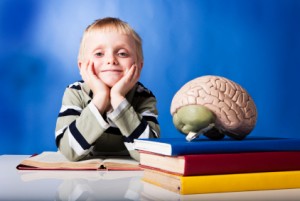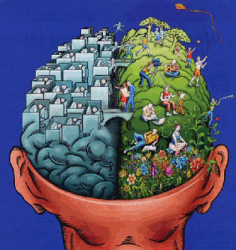 Whole Brain in Education
Whole Brain in Education
The power and energy for every single potent act and thought is a sense of self worth. The way we feel about ourselves will determine the degree of courage with which we take control of our own destinies, our ability to dream dreams of greatness, and act upon them, the state of our physical and mental health, our ability to learn and apply our talents and the capacity to give and receive genuine love.
We do not have to develop a sense of self worth or a positive self-esteem. We are born with this. However it is a gift within us that needs to be continuously honored and nurtured, just as we honor and nurture our intellect. If we are going to own and strengthen our self worth as we grow through childhood into adulthood, we will need to learn these skills as a part of our education.
Intellectual versus Emotional Thinking Styles
The problem is that education does not usually do this because educators don’t think this way. Each one of us has a favorite thinking style which seems to be the natural way our brain prefers to think. Actually this is because our brain consists of two sides – left and right – and one side is physiologically more dominant than the other. People who are left brain dominant are more comfortable thinking logically and rationally. Right brain dominant people find it easier to think emotionally and intuitively. There is enormous pressure on students of all ages to obtain high grades and to excel in left brain academic achievement.
 The Challenge for Educators
The Challenge for Educators
The research conducted by Sandy Gluckman for her PhD, as well as vast research by esteemed people in the field of education, reveals that the majority of educational institutions traditionally emphasize left brain logic, facts, figures and linear thinking more than right brain lateral, intuitive-emotional, creative thinking. There are some educational institutions that do formally aspire to provide a curriculum that offers the education of both sides of the brain. Most do not however, placing far greater emphasis on education of facts than on education of feelings. Curricula are developed with the purpose of strengthening academic abilities, usually without integrating learning opportunities to strengthen self worth and self-esteem. The students’ self-esteem and feelings of self worth and their ability to connect meaningfully with others will not get enough attention, since this is nurtured through right brain education.
The Danger for Students
As pressure increases on educational institutions, and on students, to achieve high grades, there is the danger that we could be developing academically superior students who have not developed emotionally and struggle with low self worth.
The world is undergoing massive change. Academic degrees alone will not be enough for students to courageously and creatively deal with an increasingly challenging personal and professional environment. They will need a powerful sense of self worth to propel them through this exciting and challenging new world.
Educational Keynotes
Dr. Gluckman offers fascinating keynotes and skills building programs for Principals, Teachers and College Lecturers, showing powerful and practical ways to blend the cognitive academic approach to teaching and learning with the development of creativity, courage and self- worth.


